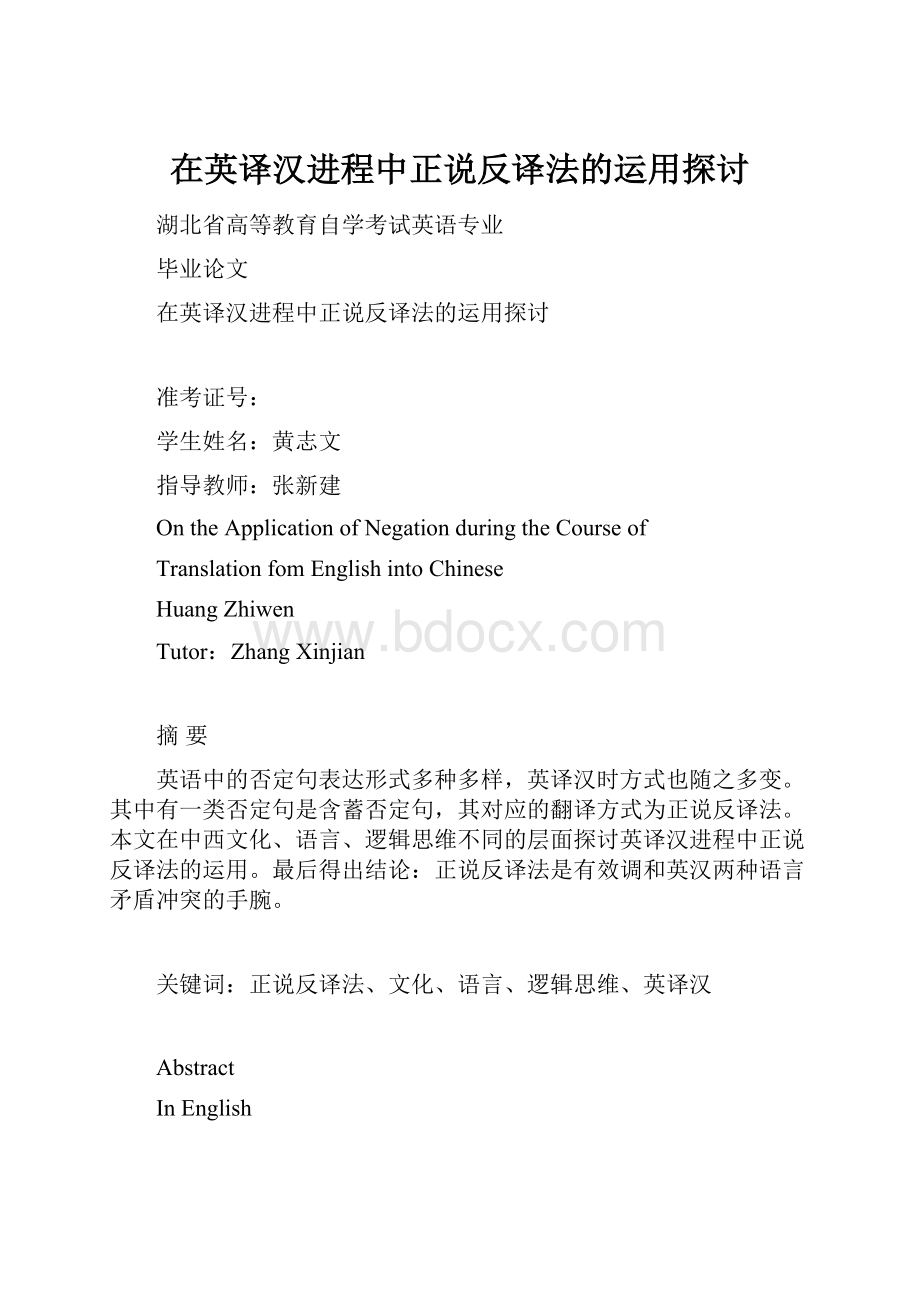 在英译汉进程中正说反译法的运用探讨.docx
在英译汉进程中正说反译法的运用探讨.docx
- 文档编号:24433627
- 上传时间:2023-05-27
- 格式:DOCX
- 页数:9
- 大小:22.44KB
在英译汉进程中正说反译法的运用探讨.docx
《在英译汉进程中正说反译法的运用探讨.docx》由会员分享,可在线阅读,更多相关《在英译汉进程中正说反译法的运用探讨.docx(9页珍藏版)》请在冰豆网上搜索。

在英译汉进程中正说反译法的运用探讨
湖北省高等教育自学考试英语专业
毕业论文
在英译汉进程中正说反译法的运用探讨
准考证号:
学生姓名:
黄志文
指导教师:
张新建
OntheApplicationofNegationduringtheCourseof
TranslationfomEnglishintoChinese
HuangZhiwen
Tutor:
ZhangXinjian
摘要
英语中的否定句表达形式多种多样,英译汉时方式也随之多变。
其中有一类否定句是含蓄否定句,其对应的翻译方式为正说反译法。
本文在中西文化、语言、逻辑思维不同的层面探讨英译汉进程中正说反译法的运用。
最后得出结论:
正说反译法是有效调和英汉两种语言矛盾冲突的手腕。
关键词:
正说反译法、文化、语言、逻辑思维、英译汉
Abstract
InEnglish
Keywords:
Introduction
InbothEnglishandChinese,therearenegative,theyarenotcompletelyexpressedinthesameway,Inotherwords,eitherofthemhasitsuniqueway.Ingeneral,EnglishnegativesentencesaremuchmorecomplicatedandvariousthanChineseonesforitswiderangeofchoicesonwords,phrasesandthewaysofexpression.
InEnglish,wecanfindasortofnegativesentencewhichapparentlyseemstobeaffirmativesentence.Suchasentenceisformallyaffirmativebutactuallyexpressesthenegativemeaningjudgingfromitsmeaning.Linguistsnamethiskindofsentenceas“ImpliedNegativeSentence”.InthecourseoftranslationfromEnglishintoChinese,translatorsaresupposedtomakeoutthesesentencesandselectthebestapproachestotranslatethem.Thesesentencesaresymbolizedbythenonequivalenceoffunctionandform.Itissuggestedthatthemethodofnegationisthemosteffectivewaytofixthisproblem.
Alargenumberofscholarshaveresearchedonnegation.Unfortunatelytheirresearchersarelimitedtojustcitinginstancesandtheyfailtofurthertheirstudies.NegationisbornfromthedifferencesofcultureandthehabitofthinkingbetweenEnglishandChinese.That
weemploynegationwillexactlyreflecttheintentionofsourcetextandcomplywiththelanguagespecification.Thispaperattemptstoexplorethemethodofnegationfromthelevelofculture,linguisticslogicthinking,etc.Finally,wedrawaconclusionthattheapproachofnegationcanbeeffectivetoreconcilethecontradictionsandconflictsbetweenChineseandEnglish.
ChapterOne:
Background
Generallyspeaking,whenaconceptisidentifiedinacertainmannerinonelanguage,itcanbealsoidentifiedeitherinthesameordifferentforminanotherlanguage.Forinstance,inChinese,是isequaltois,am,areinEnglish.Ifnegated,itwillbe不是byaddingannegativeword不before是inChinese.Similarly,itwillbeallrightinEnglishbyaddingnotafteris,am,exampleshowstheunitybetweenEnglishandChinese.
Let’scontinuelookingattwomoreinstances.不行istranslatedasnotgoodinEnglish.But很不行cannotbetranslatedintonotverygoodorverynotgood.Whensomeoneasksyou“Can’tyouspeakEnglish?
’’,youmayanswerlikethis“Yes,Ican’t.”(不,我可不能)or“No,Ican.”(是的,我会).Insuchasituation,Yesmeans不andNomeans是,whichissodifferentfromourcommonsense.ThesetwoexamplesreflecttheoppositionbetweenChineseandEnglish.
Unityandoppositesnecessarilyexistamonglanguages,becauselanguagesdependoncultures.Distinctculturessurelycultivatedistinctlanguages.Bothsimilariesanddifferencesexistineverytwolanguages.
1.Thelevelofculture
Inthechoicesofvocabularies,thetwolanguagesarenotlikelytobeabsolutelyconsistent,becausetheyarenotexactlycorresponding’slifeexperiencestendtodifferfromeachotherandtheirunderstandingoftheobjectiveworldisnotconsistent.Thereforetheydon’tselectthesamewords.Theexpressionofthetwolanguagesdoesnotcoincide.
Inneremotionvareieswiththedifferenceamongnationalities.Forexample,thankstothegeographicaldistinctions,thewindhasdifferentsymbolicsignificancesinChineseculutreandinEnglishculture.Inourmind,theeastwindiswarm.Itmakesseedsdevelopandgiveslifethepowertogrow.SothefamouspoetLanMaoinSongDynastywroteapoemwhichreads“东风破早梅,向暖一枝开。
冰雪矢人见,春从天上来。
”toeulogisethewestwind.Onthecontrary,thewestwindcomingfromtheEuropeancontinentischillyforBritish.Itmakeshumanfeeldesolate.EnglishwriterCharelsDickensoncewrote“WinterdayshaveIseenhim,standingbluenosedinthesnowandeastwind!
”(在许多冬日里,我见他鼻子冻得发紫,站在风雪和东风当中。
)Instead,theBritishpeopleshowloveforthewind.ThefamouspoetShellythereforecomposedthepoem“OdetotheWestWind”
Wecansafelysaythattheprocessoftranslationisacourseoftransferofnotonlylanguagesbutalsocultures.Asamatteroffact,translationiscross-culturalcommunication.
Owingtotheinfluenceofsocialcultureandlifestyle,weChinesegreatlydifferfromEnglish-speakingpeopleinthehabitofthoughtandlanguages.Althoughinbothlanguagestherearesituationswheresomeconceptsaredescribedfromtheoppositeperspective,weshouldmakeitclearthattheyareverydifferentbecauseoftheirownspecificcultures.Onlyifwehaveabetterunderstandingoftheseculturaldistinctions,wecanavoidcommittingcommunicationalerrors.
2.Linguisticlevel
Inmostcases,theformofasentenceandthemeaningitconveysarenotintegrated,ButinEnglish,whentalkingorwriting,peopleoftenconveythenegativeinformationbymeansofaffirmativeformaccordingtotheircommunicationalpurposessoastoappropriatelyexpresstheiremotion.ThisphenomenoniscalledIndirectSpeechActwhichissymbolizedbynonequivalenceoffunctionandform.Andit’sanothercharacterizeisthattheliteralmeaningandtherealmeaningarenotharmorous.
Ifliterallytranslated,thiskindofsentenceswillreadhardorevenbewrong,resultinginfailingtranslation.Providingresortingtothemethodofnegation,theproblemmaybesmoothlysolved.Theresultisboundtobesatisfactory.
Chaptertwo:
theeffectofnegation
Let’slookatthefollowingthreesentences:
(1)You’retellingme.不用你来指教
(2)Keepoffthelawn.请勿踩踏草坪
(3)Hegotclearaway.他逃得无影无踪
Sentence1doesn’tmean你告知我but不用你来指教.Thissentenceisusedinsuchasituationwheresomeoneistiredoftheotherperson’smeaninglessremarks.Theantonymictranslationofthissentencecontributestostrengthenthetone.Insentence2,Keepoffisequalto离开,别靠近sothedirecttranslationis别靠近草坪.Comparedwiththedirection,theantonymictranslationiseasiertoattractreader’sattentionandmorepolite.Thelastsentenceiswelltranslatedduetoitsappropriatewordingbyprocessingclearawayinto无影无踪.
Again,I’llmentionthatcertainaffirmationscanbetranslatedeitheraffirmativelyornegatively.Sometimesantonymictranslationmayyieldbetterresults.ItisanalysedthatChinesetendtoimaginalthinking,whilewesternerstendtoabstractthinking.Atthetimeofwriting,weareinterestedinselectingprettywordsormakinguseofrhetoriitsctomakethewritingsvivid.Becauseofthedifferencesofemotionalfoundationaswellasreadinghabits,however,English-speakingpeopleareagaintus.Theypreferunderstatementandarguethatperttywords
willpreventtheexplicitnessofwhatthewriterswanttoconveyinthearticles.Themethodofnegationcaneffectivelythislanguageapprepriatethefollowingsentesnces:
I’matalosswhattodo.我茫然惊惶失措.
Therewasapoorattandceatthemeeting.出席会议的人寥寥无几.
Heturnedadeafeartomyearstomydavice.他对我的忠告漠不关心.
Exampleisbeeterthanprecept.言传不如身教
Ittakestwotomakeaquarrel.一个巴掌拍不响.
Beautyisbutskin-deep.不能够貌取人。
Lifeislongifitisfull.年华不虚度,生命自悠长.
Keepstill假设无其事
Chapterthree
thepracticeofantonymictranslationinconciling
theconflictsbetweenEnglishandChinesein
thecourseoftranslation
Asamatteroffact,negationismoreoftenjustaviewofpointoracertainperspectiveaboutsomethingorsomeideas.Somethingseeminglyaffirmativemaylooknegativeviewedfromtheoppositeaspect.Asaresult,aword,phrase,orsentencecanoftenbetranslatedaseitherthenegativeortheaffirmative.Thismaybecausedbydifferentfocusofpeoplespeakingdifferentlanguages.Lookatthefollowingsentences:
(1)Heislittlemorethanachild.
(2)Mothersaidfatherwouldcomesoon,butMaryknowbetter.
Directtranslationofsentence1as他比小孩大不了多少wouldmakenoclearsense.Itshouldbetranslatedas他完全仍是个小孩.“Knowbetter”insentence2shouldnotbetranslatedinto明白得更好asitisimplied:
Marythoughtdifferentlyordisagreedwithhermother,soacorrecttranslationshouldbe玛丽明白(爸爸)可不能(专门快回来).WhilewecomeacrosstheImpliedNegativeSentence,weoughttobecarefull.Weallknowthattranslationisbasedonunderstandingandmistakencomprehensionissuretoleadtotranslationerror.Forexample,“Justimagineit”isexpectedtobetranslatedinto不可能/没想
到.Thisisanidiom.Ifweareignorantofit,chanceswillbethatwemaythinkitmeans把它想一下.AccoringtoourEnglishkonwledge,thenormalstatementof真没想到shouldbe“Ican’timagineit.”whichisrightcontraryto“Justimagineit”.Thereasonwhythesamestatementinthetwolanguagesdoesn’tkeepinlinemaybethatthefocusofthetwolanguagesisdifferent.EnglishthinnksaffirmationisdirectbutChinesebelievenegationishelpfultostrengthenthefeeling.
Suchsituationscanbefoundinthesefollowingsentences:
(1)Youcantalk.(Youdon’thavetoworryaboutdoingaparticularthingyourself)你没必要担忧自己要干什么(≠你能发言)
(2)Metellalie.我从不扯谎(≠我扯谎)
(3)Catchingmedoingthat.我绝不干那样的事(≠抓住我干那事)
(4)AsifIcared.我无所谓(≠仿佛我在意)
(5)I’llbuyit.我不懂∕我答不出来(≠我将买它)
Allthesesentencesareidiomsorslangs.ComparingtheChinesetranslation,wecanfindthattheyareallnegations.Theaffirmativetranslationscannotrepresentthetruemeaning.OncemorewecanconcludethatthemethodofnegationcanreducethecontradictionsbetweenEnglishandChinese.
Partofaffirmationsmustbetranslatedbyantonymictranslationincaseofmisunderstandingortranslationerrors.Forinstance:
(1)I’mastrangerinthisto
- 配套讲稿:
如PPT文件的首页显示word图标,表示该PPT已包含配套word讲稿。双击word图标可打开word文档。
- 特殊限制:
部分文档作品中含有的国旗、国徽等图片,仅作为作品整体效果示例展示,禁止商用。设计者仅对作品中独创性部分享有著作权。
- 关 键 词:
- 英译汉 进程 中正 说反译法 运用 探讨
 冰豆网所有资源均是用户自行上传分享,仅供网友学习交流,未经上传用户书面授权,请勿作他用。
冰豆网所有资源均是用户自行上传分享,仅供网友学习交流,未经上传用户书面授权,请勿作他用。


 《当代世界政治与经济》.docx
《当代世界政治与经济》.docx
